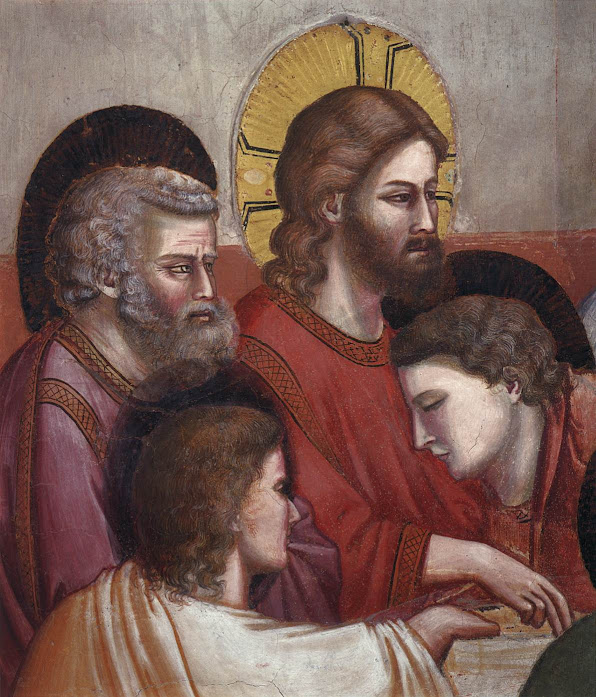Giotto di Bondone c1265-1337 was the first of the great Italian painters, active in Florence. He decorated chapels and churches in Assisi, Rome, Padua, Florence, and Naples with frescoes and panel paintings. Because little of his life and few of his works are documented, attributions and a stylistic chronology of his paintings remain problematic and often highly speculative. His works in Rome include the heavily restored mosaic of Christ Walking on the Water over the entrance to St. Peter’s Basilica, and an altarpiece from St. Peter’s, now in the Vatican Museum. In Padua, his fresco of the Last Judgment decorates the western wall of the Arena Chapel, and the rest of the chapel is covered with his narrative frescoes featuring scenes from the lives of the Virgin Mary and Christ. Later in his career he executed frescoes in four chapels in the church of Santa Croce in Florence, two of which survive. In 1334 he was appointed surveyor of Florence Cathedral; his design for the campanile was altered after his death. The most important extant panel painting attributed to him is The Madonna in Glory (c. 1305–10). He achieved great fame in his lifetime, and he is considered the father of European painting for breaking with the impersonal stylisations of Byzantine art and introducing new ideals of naturalism and humanity, three-dimensional space, and three-dimensional form. The course of Italian painting was dominated by his students and followers. His work points to the innovations of the Renaissance style that developed a century later.
For earlier works by Giotto see parts 1 - 3 also.
This is part 4 of a 6-part series on the works of Giotto.
Scenes from the Life of Christ (continued from part 3):
 |
| Massacre of the Innocents fresco 200 x 185 cm |
 |
| Massacre of the Innocents detail |
 |
| Massacre of the Innocents detail |
 |
| Christ among the Doctors fresco 200 x 185 cm |
 |
| Christ among the Doctors detail |
 |
| Baptism of Christ fresco 200 x 185 cm |
 |
| Baptism of Christ detail |
 |
| Marriage at Cana fresco 200 x 185 cm |
 |
| Marriage at Cana detail |
 |
| Marriage at Cana detail |
 |
| Marriage at Cana detail |
 |
| Raising of Lazarus fresco 200 x 185 cm |
 |
| Raising of Lazarus detail |
 |
| Raising of Lazarus detail |
 |
| Entry into Jerusalem fresco 200 x 185 cm |
 |
| Entry into Jerusalem detail |
 |
| Entry into Jerusalem detail |
 |
| Entry into Jerusalem detail |
 |
| Expulsion of the Money-changers from the Temple fresco 200 x 185 cm |
 |
| Expulsion of the Money-changers from the Temple detail |
 |
| Judas' Betrayal fresco 150 x 140 cm |
 |
| Judas' Betrayal detail |
 |
| Last Supper fresco 200 x 185 cm |
 |
| Last Supper detail |
 |
| Washing of Feet fresco 200 x 185 cm |
 |
| Washing of Feet detail |
 |
| Washing of Feet detail |
 |
| Washing of Feet detail |
%20fresco%20200%20x%20185%20cm%201.jpg) |
| The Arrest of Christ (Kiss of Judas) fresco 200 x 185 cm |
%20fresco%20200%20x%20185%20cm%202.jpg) |
| The Arrest of Christ (Kiss of Judas) detail |
%20fresco%20200%20x%20185%20cm%203.jpg) |
| The Arrest of Christ (Kiss of Judas) detail |
%20fresco%20200%20x%20185%20cm%204.jpg) |
| The Arrest of Christ (Kiss of Judas) detail |
 |
| Christ before Caiaphas fresco 200 x 185 cm |
 |
| Christ before Caiaphas detail |
 |
| Mocking of Christ fresco 200 x 185 cm |
 |
| Mocking of Christ detail |
 |
| Mocking of Christ detail |
 |
| Road to Calvary fresco 200 x 185 cm |
 |
| Road to Calvary detail |
 |
| The Crucifixion fresco 200 x 185 cm |
 |
| The Crucifixion detail |
Note: Scenes from the Life of Christ continues in part 5.




%20%20Basilica%20of%20Saint%20Francis%20of%20Assisi,%20Assisi,%20Italy.jpg)
%20tempera%20on%20wood%20178%20c%2089%20cm%20(sentral%20panel)%20c168%20x%2083%20cm%20(side%20panels)%20Museo%20Vaticani,%20Vatican%20City.jpg)
%20tempera%20on%20wood%20178%20c%2089%20cm%20(central%20panel)%20c168%20x%2083%20cm%20(side%20panels)%20Museo%20Vaticani,%20Vatican%20City*.png)








%20tempera%20on%20panel%20220%20x%20245%20cm.jpg)




%201%20tempera%20on%20panel%20220%20x%20245%20cm%20copy.jpg)
%202.jpg)




















